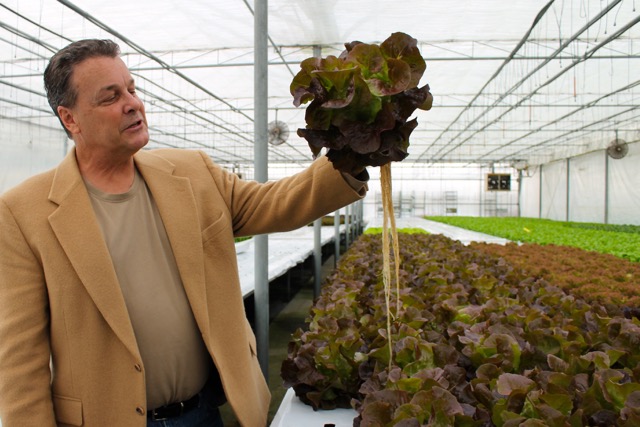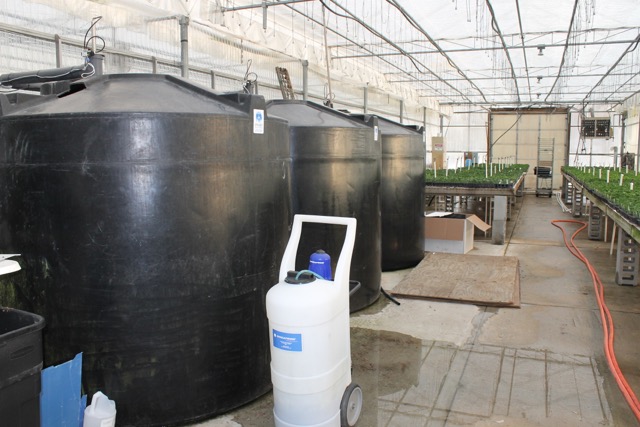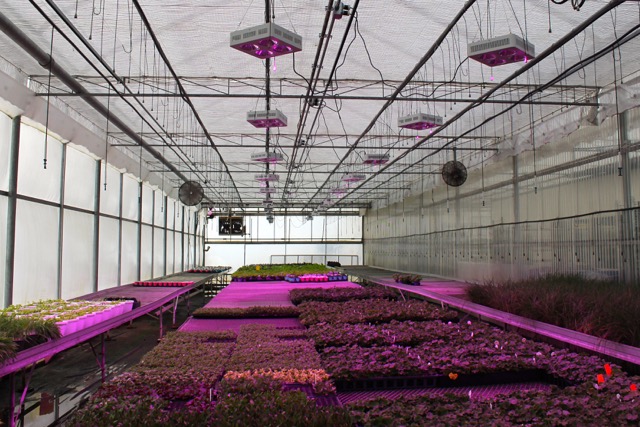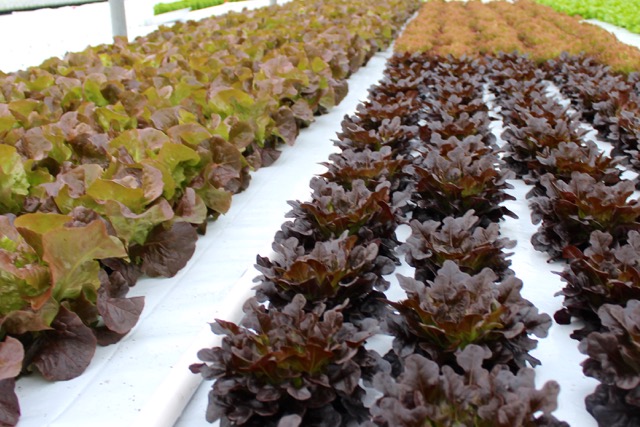Technology is now making it possible for Long Island farmers to produce crops year-round and Jamesport grower Carl Gabrielsen has made it his personal mission to make sure fellow farmers know it.
Gabrielsen can barely contain his enthusiasm as he takes visitors on a tour of his greenhouse facilities on West Lane in Aquebogue, where he’s grown fresh lettuce hydroponically all winter, producing about 3,000 heads per week.
 “We have to be able to produce year-round to stay competitive,” Gabrielsen said yesterday, “and I want other farmers to know it can be done and the means to do it is within their reach.”
“We have to be able to produce year-round to stay competitive,” Gabrielsen said yesterday, “and I want other farmers to know it can be done and the means to do it is within their reach.”
Hydroponics is a method of growing plants without soil. They are grown in an inert growing medium and a balanced, pH-adjusted water-based nutrient solution. Plants grow faster and growers enjoy higher yields, making it an ideal method for commercial food production.
Gabrielsen’s hydroponics operation on West Lane — one of three greenhouse facilities operated by his company, Gabrielsen Farms, is the ultimate in hi-tec growing. But growers don’t need to build large greenhouses and buy expensive factory-made systems to get started with hydroponics, he said. They can build their own hydroponic growing beds and begin with a frame- or hoop-house. The economic benefits realized will pay for their investment in no time, he said.
“They can put together a great set-up for less than the cost of a new tractor,” Gabrielsen said.
Gabrielsen and head grower David McLarin dabbled in hydroponics last year, took classes at the University of Arizona and quickly became completely hooked. They went into full production mode with it this winter and plan to expand again next winter.
 For farmers who are already greenhouse growers, it’s really a no-brainer, both men said.
For farmers who are already greenhouse growers, it’s really a no-brainer, both men said.
“It’s a totally closed system. We recycle all our water. Nothing goes into the ground,” he said.
Plant food is delivered through the water that the plants are grown in. The solution is mixed in large tanks controlled by sophisticated computers.
“The computer measures it and dispenses it as the tank calls for it. We never touch it,” Gabrielsen said.
They use no pesticides. Instead they rely on beneficial insects, employing integrated pest management principles.
 State-of-the-art LED grow lights provide the plants with light and bathe the interior of the greenhouses in a pleasant purple-pink glow. The bulbs last for 50,000 hours and use 20 percent of the electricity of regular lights, Gabrielsen said. Gabrielsen Farms has solar panels on site to generate enough power to run the West Lane greenhouses without buying any electricity from PSEG.
State-of-the-art LED grow lights provide the plants with light and bathe the interior of the greenhouses in a pleasant purple-pink glow. The bulbs last for 50,000 hours and use 20 percent of the electricity of regular lights, Gabrielsen said. Gabrielsen Farms has solar panels on site to generate enough power to run the West Lane greenhouses without buying any electricity from PSEG.
Once a seed is planted in the growing medium and its placed in a slot in the hydro bed, the plant never needs to be touched. From seed to maturity, a hydroponically grown head of lettuce is ready to be packed and shipped in six or seven weeks. And it’s packed and shipped in a plastic clamshell with its root system intact, preserving its full flavor, Gabrielsen said.
“Restaurants can’t get enough of fresh, local vegetables, especially in winter. There’s just no comparison,” Gabrielsen said. “We could have sold triple what we did this winter if we had the crops to supply them, it’s in such demand.”
Gabrielsen Farms is a wholesale-only operation. Besides selling to area restaurants this winter, it’s supplied fresh local lettuce to the 21 Best Yet supermarkets across Long Island.
 The operation is environmentally safe and economically sound — costs are much lower and more crop can be grown in less space.
The operation is environmentally safe and economically sound — costs are much lower and more crop can be grown in less space.
Gabrielsen is now transitioning from lettuce to flowers inside the greenhouse. Flowers will be grown through July, then the greenhouses will be geared up for winter vegetable production again.
Next winter he’ll add more hydroponic beds and grow additional crops, Gabrielsen said. There’s plenty of room to expand in his 300,000-square-foot facility. He used only a portion of it for hydroponic growing this year.
“It’s really very exciting,” he said. “You get to supply local customers with fresh produce in the off-season and you keep your workers employed, too.”
Other local greenhouse growers are beginning to experiment with off-season vegetable production, too, Gabrielsen said. “And I want to do everything I can to spread the word about how it works and how good it can be.”
The survival of local journalism depends on your support.
We are a small family-owned operation. You rely on us to stay informed, and we depend on you to make our work possible. Just a few dollars can help us continue to bring this important service to our community.
Support RiverheadLOCAL today.































